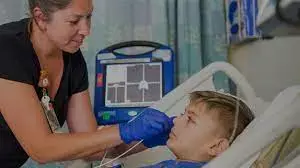- Home
- Medical news & Guidelines
- Anesthesiology
- Cardiology and CTVS
- Critical Care
- Dentistry
- Dermatology
- Diabetes and Endocrinology
- ENT
- Gastroenterology
- Medicine
- Nephrology
- Neurology
- Obstretics-Gynaecology
- Oncology
- Ophthalmology
- Orthopaedics
- Pediatrics-Neonatology
- Psychiatry
- Pulmonology
- Radiology
- Surgery
- Urology
- Laboratory Medicine
- Diet
- Nursing
- Paramedical
- Physiotherapy
- Health news
- Fact Check
- Bone Health Fact Check
- Brain Health Fact Check
- Cancer Related Fact Check
- Child Care Fact Check
- Dental and oral health fact check
- Diabetes and metabolic health fact check
- Diet and Nutrition Fact Check
- Eye and ENT Care Fact Check
- Fitness fact check
- Gut health fact check
- Heart health fact check
- Kidney health fact check
- Medical education fact check
- Men's health fact check
- Respiratory fact check
- Skin and hair care fact check
- Vaccine and Immunization fact check
- Women's health fact check
- AYUSH
- State News
- Andaman and Nicobar Islands
- Andhra Pradesh
- Arunachal Pradesh
- Assam
- Bihar
- Chandigarh
- Chattisgarh
- Dadra and Nagar Haveli
- Daman and Diu
- Delhi
- Goa
- Gujarat
- Haryana
- Himachal Pradesh
- Jammu & Kashmir
- Jharkhand
- Karnataka
- Kerala
- Ladakh
- Lakshadweep
- Madhya Pradesh
- Maharashtra
- Manipur
- Meghalaya
- Mizoram
- Nagaland
- Odisha
- Puducherry
- Punjab
- Rajasthan
- Sikkim
- Tamil Nadu
- Telangana
- Tripura
- Uttar Pradesh
- Uttrakhand
- West Bengal
- Medical Education
- Industry
Physiologically focused CPR training fails to Improve Survival in Kids With Cardiac Arrest: Study

Physiologic Point-of-Care Cardiopulmonary Resuscitation Training has no significant impact on hospital discharge with favourable neurologic outcomes among pediatric patients who experienced cardiac arrest in the ICU, according to a recent study published in the JAMA.
Approximately 40% of children who experience an in-hospital cardiac arrest survive to hospital discharge. Achieving threshold intra-arrest diastolic blood pressure (BP) targets during cardiopulmonary resuscitation (CPR) and systolic BP targets after the return of circulation may be associated with improved outcomes.
A study was conducted to evaluate the effectiveness of a bundled intervention comprising physiologically focused CPR training at the point of care and structured clinical event debriefings.
Design, Setting, and Participants A parallel, hybrid stepped-wedge, cluster-randomized trial (Improving Outcomes from Pediatric Cardiac Arrest—the ICU-Resuscitation Project [ICU-RESUS]) involving 18 pediatric intensive care units (ICUs) from 10 clinical sites in the US. In this hybrid trial, 2 clinical sites were randomized to remain in the intervention group and 2 in the control group for the duration of the study, and 6 were randomized to transition from the control condition to the intervention in a stepped-wedge fashion. The index (first) CPR events of 1129 pediatric ICU patients were included between October 1, 2016, and March 31, 2021, and were followed up to hospital discharge (final follow-up was April 30, 2021).
During the intervention period (n = 526 patients), a 2-part ICU resuscitation quality improvement bundle was implemented, consisting of CPR training at the point of care on a manikin (48 pieces of training/unit per month) and structured physiologically focused debriefings of cardiac arrest events (1 debriefing/unit per month). The control period (n = 548 patients) consisted of usual pediatric ICU management of cardiac arrest.
The primary outcome was survival to hospital discharge with a favourable neurologic outcome defined as a Pediatric Cerebral Performance Category score of 1 to 3 or no change from baseline (score range, 1 [normal] to 6 [brain death or death]). The secondary outcome was survival to hospital discharge.
Results:
Among 1389 cardiac arrests experienced by 1276 patients, 1129 index CPR events (median patient age, 0.6 [IQR, 0.2-3.8] years; 499 girls [44%]) were included and 1074 were analyzed in the primary analysis. There was no significant difference in the primary outcome of survival to hospital discharge with favourable neurologic outcomes in the intervention group (53.8%) vs control (52.4%); risk difference (RD), 3.2% (95% CI, −4.6% to 11.4%); adjusted OR, 1.08 (95% CI, 0.76 to 1.53). There was also no significant difference in survival to hospital discharge in the intervention group (58.0%) vs control group (56.8%); RD, 1.6% (95% CI, −6.2% to 9.7%); adjusted OR, 1.03 (95% CI, 0.73 to 1.47).
Thus, in this randomized clinical trial conducted in 18 pediatric intensive care units, a bundled intervention of cardiopulmonary resuscitation training at the point of care and physiologically focused structured debriefing, compared with usual care, did not significantly improve patient survival to hospital discharge with favourable neurologic outcome among pediatric patients who experienced cardiac arrest in the ICU.
Reference:
Effect of Physiologic Point-of-Care Cardiopulmonary Resuscitation Training on Survival With Favorable Neurologic Outcome in Cardiac Arrest in Pediatric ICUs: A Randomized Clinical Trial: The ICU-RESUS and Eunice Kennedy Shriver National Institute of Child Health; and Human Development Collaborative Pediatric Critical Care Research Network Investigator Groupq
https://jamanetwork.com/journals/jama/article-abstract/2789660
Keywords:
Cardiopulmonary Resuscitation Training, Favorable Neurologic Outcome, Outcome in Cardiac Arrest in Pediatric ICUs, Effect of Physiologic Point-of-Care Cardiopulmonary Resuscitation in pediatric cardiac arrest, JAMA
Dr. Shravani Dali has completed her BDS from Pravara institute of medical sciences, loni. Following which she extensively worked in the healthcare sector for 2+ years. She has been actively involved in writing blogs in field of health and wellness. Currently she is pursuing her Masters of public health-health administration from Tata institute of social sciences. She can be contacted at editorial@medicaldialogues.in.
Dr Kamal Kant Kohli-MBBS, DTCD- a chest specialist with more than 30 years of practice and a flair for writing clinical articles, Dr Kamal Kant Kohli joined Medical Dialogues as a Chief Editor of Medical News. Besides writing articles, as an editor, he proofreads and verifies all the medical content published on Medical Dialogues including those coming from journals, studies,medical conferences,guidelines etc. Email: drkohli@medicaldialogues.in. Contact no. 011-43720751


